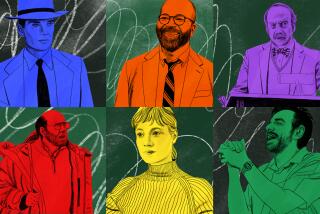She tried to seduce us, and did
- Share via
Anne Bancroft was only six years older than Dustin Hoffman when she played a woman twice his age. Then, as now, a woman’s age was a complicated thing in the movies, requiring highly theoretical recalibrations. Sometimes, like in “The Graduate,” it was the whole story. Bancroft was 36 when the movie was made, an age that either gets nudged past 40 when it appears on-screen or, if a star’s status allows it, arrested in a vague, childish, eternal 26.
It’s tempting to think Bancroft drew on this irony to create her brilliant turn as the masterfully manipulative, coolly defiant Mrs. Robinson, she of the highly developed sense of the absurd. Bancroft may have won an Oscar for her portrayal of the beatific Annie Sullivan in “The Miracle Worker,” but it’s as Mrs. Robinson -- holding her cigarette smoke while Benjamin kisses her for the first time; suddenly noticing a stain on her blouse when he first puts a hand on her breast -- that she will be remembered.
“The Graduate” is one of the best movies ever made, but it’s unrelentingly cruel to its heroine, having settled, probably long before Bancroft walked onto the set, on an image of Mrs. Robinson as a vampire. In the movie’s most memorable sequence, which runs the course of two full songs without dialogue, Benjamin Braddock goes from fresh-faced future Republican to glazed, impassive degenerate in the course of a few lazy afternoons at the Taft Hotel. Mrs. Robinson doesn’t liberate him as much as she obliterates his former self.
In the years since Bancroft brought Mrs. Robinson to life, the older woman-younger man scenario has become more commonplace in the movies. Gone are all the desperate Blanche Duboises and Norma Desmonds, whose reluctance to close up shop, sexually and romantically, in middle age was seen as a sure sign of insanity. These days, it’s Diane Keaton in “Something’s Gotta Give,” Frances McDormand in “Laurel Canyon” and Angela Bassett in “How Stella Got Her Groove Back” (not to mention Demi Moore on the cover of Us Weekly), which is progress of a sort, but the new movie scenarios often lack the power that Bancroft brought to the role. Mrs. Robinson seduces Benjamin in the same way a cat seduces a mouse. She has no desire to reconnect with her youth or even to connect with Benjamin, despite his occasional clumsy stab at conversation. Their relationship doesn’t seem to be about sex at all. For Mrs. Robinson, whom Ben is never invited to call anything other than that, it’s strictly about power.
As a villain, Mrs. Robinson was a straw man constructed from received wisdom and atavistic fear. But Bancroft infused the role with fierceness and dignity, bringing her to life as a brilliant, vulnerable, righteously angry and supremely, exquisitely bored midcentury, middle-class matron. With her brains, skills, perspective and awe-inspiring sang-froid, Mrs. Robinson could have run a corporation but had to settle for running Benjamin.
The moral of “The Graduate” could be read a thousand ways; even Ben and Elaine’s happy ending shows glimpses of a boring middle. We learn that Mr. and Mrs. Robinson will file for divorce and assume that Elaine will stop talking to her mother. But Bancroft isn’t the type to descend into mascara-stained victimhood. She stays in the real world. No cops or orderlies come to her door. Nobody feels sorry for Mrs. Robinson. Some people think: Good for her.
“The Graduate” was an instant “anti-establishment” classic when it was made, when the promise of youth culture and counterculture was still fresh, before everybody was a rebel. The movie ends on Benjamin and Elaine, moving into the future as dozens of stunned geezers stare at them open-mouthed. But almost 40 years later, it looks like Paul Simon had the right idea. Thanks to Bancroft, it was Mrs. Robinson’s story in the end. Now that we have Bens and Elaines coming out of our ears, Mrs. Robinson -- half-naked in leopard-print lingerie, coolly floating the theory that experience makes youthful idealism look sort of dumb -- really looks like something. A nation turns its lonely eyes to her? She rolls her eyes and thinks, grow up.
More to Read
Only good movies
Get the Indie Focus newsletter, Mark Olsen's weekly guide to the world of cinema.
You may occasionally receive promotional content from the Los Angeles Times.










